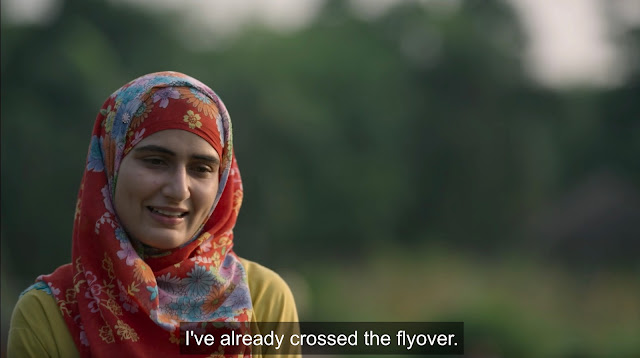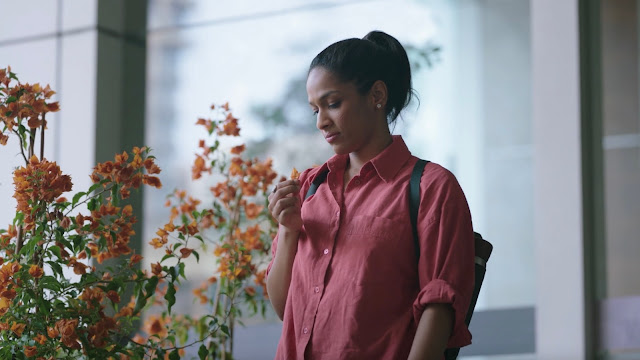
Every Friday, the New York Times publishes a column called Modern Love. It has stories about love and life in the contemporary world. Anyone can submit a story and get published (after it manages to make it past the editors). More than the story, I like the writing in the columns—touching, moving, and grieving. Sometimes, just one thought makes the column insanely beautiful. I keep dreaming that I will get published in it someday. Two seasons of Modern Love have been released in the last few years that adapted some of these stories into a show. Neither of those seasons really worked for me. It is probably because the joy of feeling someone's writing gets lost in the cinematic depiction. The show was not bad at all, but there was not much in there that moved me. It is the same feeling I had while watching the Hindi adaptation of the series called Modern Love: Mumbai on Amazon Prime Video. There are six stories, each depicting a different form of love. However, the series is mainly dull, and it left me cold. The six stories have an object of affection, using which the writers bring out the different films' themes.
The theme of Shonali Bose's Raat Rani is love for the self. There is a Kashmiri domestic help Lalzari (Fatima Sana Sheikh), whose husband Lutfi (Bhupendra Jadawat) has left her. He used to drop Lalzari at her employer's home on a scooter, but now she rides a bicycle to work. It is a struggle for her when she has to cross a flyover on the way. She gets tired and exhausted. She even tries to jump off it at one point due to frustration. However, she huffs and puffs but manages to not give up for a few days. And, gradually, she learns to ride the cycle over the bridge. The film uses this flyover as a symbol of her emancipation. Like Rani (Kangana Ranaut) in Queen, she goes to thank her husband for leaving her because, otherwise, she would have been sleeping all her life. She repairs the roof of her house and makes it her own Taj Mahal. She starts a small business of her own. She learns to enjoy the ice cream on her own. Later, she also crosses the Sea Link, where two-wheelers are forbidden. It is in defiance of all the forced rules that society put on her. She has crossed the flyover, surpassing everything she was told not to do.

Same-sex love forms the crux of Hansal Mehta's Baai. There is Manzu (Pratik Gandhi), a gay Muslim man who comes back to visit his ailing grandmother Baai (Tanuja). He works in Goa and is engaged to a chef Rajveer (Ranveer Brar). Manzu is out to his family except for Baai, who does not know about his sexuality. The object of the affection in the film is music. Manzu has his first tryst with love over the staircases of Lucky Manzil while listening to music with a friend. Later, Manzu becomes a professional singer at a high-end resort in Goa, where he meets Rajveer. At one point, he tells Rajveer that music has no barriers. It equalizes everything. It was because of music that he met new people in life. It was music that helped him get a voice.

Vishal Bhardwaj depicts parental love in Mumbai Dragon. Set in the Chino-Indian community of Mumbai, the film depicts the story of Sui (Yann Yann Yeo), who cannot accept her son Ming's choices (Meiyang Chang). Ming is in love with a Gujarati girl Megha (Wamiqa Gabbi). Sui believes that Megha will turn her son vegetarian, and he will forget his roots. The film uses food to symbolize Sui's overbearing love for her son. She sends non-vegetarian food to his son daily, who lives as a paying guest with Megha in her father's house. The refrigerator has no space to keep more of it. It is a representation that her mother cannot let go of her son as she keeps filling it with her love. Ming calls it a cage where no one else except her is allowed to love him. Towards the film's end, Sui sends three boxes, and one of them has vegetable stir fry. Sui will probably never be able to let go, but she is at least trying to make some space for a vegetarian dish in her son's refrigerator.

Alankrita Shrivastava's My Beautiful Wrinkles depicts the story of forbidden love between a young man Kunal (Danesh Razvi), and his elder tutor Dilbar (Sarika). Having shades of Shrivastava's Lipstick Under My Burkha, the film makes the point that age is no bar for love. Kunal fantasies about Dilbar, who is initially disturbed when she learns about it. However, they gradually accept their fantasies for each other and continue to remain friends. The object of affection in this film is an old car owned by Dilbar's lover Iqbal, who tragically died in a car accident. Dilbar never sold the car and kept it with her all through the years, even though it was idling away. Dilbar takes inspiration from a former classmate's book Confessing Your Way To Happiness, gets rid of the car, and learns to move on in life.

In Dhruv Sehgal's I Love Thane, there is the theme of young love. Saiba (Masaba Gupta) is a landscape architect, tired of meeting unlikeable guys on dating apps. She meets Parth (Ritwik Bhowmik), who works in the government office. Parth never left Thane and wants to make it an idyllic place for its residents. He is not interested in any social media websites, such as Instagram. The film uses artificial trees as Saiba's quest to look for something real. "Nobody cares if it is real or synthetic," a client tells her. Saiba's dating profile says, "Keep it real." Parth wants to make the park in Thane because "Life breathes here." In the end, Saiba finds someone real and honest in Parth.

In Nupur Asthana's Cutting Chai, marital love takes center stage where a homemaker Latika (Chitrangada Singh), struggles to finish her first novel due to the sheer amount of household work. Her husband, Daniel (Arshad Warsi), does not really support her. True to her profession of being a writer, Latika imagines the different scenarios in her head if she had chosen to build a life with her ex-boyfriend Vikram (Siddhant Karnick). Using cutting chai, the film belabors the point that our chances and choices make us who we become in life. Latika had met Daniel at a function where he offered her cutting chai instead of bland coffee. Her life changed after the encounter. The film also uses trains to make its point. Latika does not get on the train with Vikram, but she rides the train (of life) with Daniel. She might think about her past but does not regret her choices. She might struggle to give a story to her characters, but it does not mean she will eliminate them from her life.

I wonder if Modern Love: Mumbai did not work for me because it is too real. Everything is too subtle. I love the joyful romances. I love the star-crossed doomed lovers. I love the reincarnated lovers. Nobody is making good romantic films these days. Yes, reality makes us grounded, but sometimes, we all need to escape to a world that is larger than life.
Dialogue of the Day:
"Pyaar ko rokna bhi toh nafrat phailane jaisa hai."
—Shaheen, Baai (Modern Love: Mumbai)

No comments:
Post a Comment
Post a comment